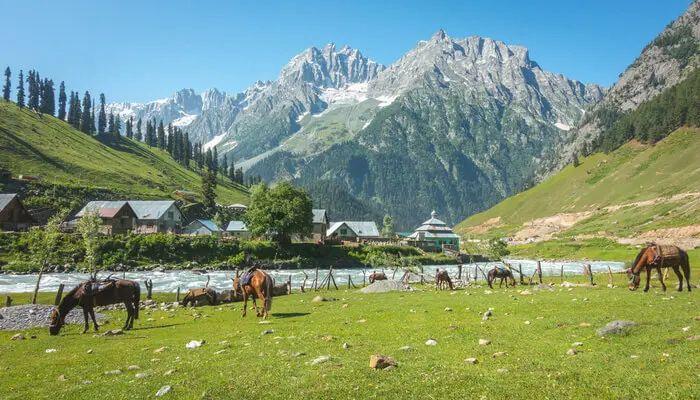Dal Lake Diaries: A Soulful Ride Through Srinagar’s Heart

Nestled in the lap of the Himalayas, Srinagar is a city that seems to float between dreams and reality. Its charm lies not only in its mountains or gardens but in the calm waters of Dal Lake-a shimmering mirror reflecting the soul of Kashmir. Often called the “Jewel in the Crown of Kashmir,” Dal Lake holds centuries of stories, traditions, and emotions. Beyond being a scenic wonder, it represents a way of life for thousands who call its banks home. The colorful houseboats, shikaras (wooden boats), and surrounding Mughal gardens weave together an experience that feels timeless. This soulful journey through Dal Lake is more than a sightseeing trip-it’s a passage through history, culture, and emotion.
The Allure of Dal Lake
Dal Lake is not just a water body; it is the heartbeat of Srinagar. Spread over 18 square kilometers, it changes its colors with every season-sparkling blue in summer, golden in autumn, and softly frozen during winter. For locals, it’s a source of livelihood, while for visitors, it’s an escape into tranquility. The sight of sunrise from a houseboat window or the rhythmic sound of a shikara gliding over the lake surface has inspired poets, painters, and travelers for generations.
In recent years, travelers have increasingly sought Kashmir packages that include a stay on Dal Lake. These packages allow visitors to experience the authentic Kashmiri lifestyle-drifting through floating markets, savoring traditional wazwan cuisine, and witnessing the reflection of snow-clad peaks on still waters. Such curated travel experiences offer a blend of comfort and culture, helping visitors explore the valley’s natural beauty with convenience and depth.
A Journey Through Kashmir’s Living Heritage
Every journey on Dal Lake reveals something deeper about the valley’s identity. The houseboats-some over a century old-stand as living museums of craftsmanship. Their intricate walnut wood carvings and handwoven carpets tell tales of generations who poured their artistry into every detail. Floating gardens, locally called “Rad,” are another marvel, where vegetables and flowers grow on the lake’s surface using layers of water plants and soil. These sustainable farming techniques have existed for hundreds of years, blending human ingenuity with nature’s grace.
Surrounding Dal Lake are some of the most famous Kashmir attractions, including the Mughal Gardens like Shalimar Bagh, Nishat Bagh, and Chashme Shahi. These historical gardens were built during the Mughal era to celebrate harmony between architecture and nature. A visit to these sites not only enhances the Dal Lake experience but also provides insight into how the region’s heritage evolved through art, design, and philosophy.
The Cultural and Spiritual Essence
Dal Lake is more than a destination-it’s an emotion that connects people to nature and spirituality. For locals, it’s part of daily life. For travelers, it’s a place to reflect and reconnect with themselves. The peaceful atmosphere and soft ripples on the water encourage mindfulness and inner peace. This aligns with the ancient Indian concept of sahajata-living in natural harmony with one’s surroundings. Whether it’s early morning prayers echoing from nearby mosques or the soft laughter of children rowing to floating schools, the lake embodies a quiet rhythm of coexistence.
Tourism initiatives have also emphasized preserving this ecological and cultural heritage. Eco-friendly houseboats and community-based tourism programs are being introduced to ensure that Dal Lake continues to thrive as both a natural wonder and a cultural icon.
A Modern-Day Travel Experience
Modern travelers seek experiences that connect them to local life rather than mere sightseeing. Spending a night on a houseboat, riding a shikara at sunset, or shopping at the floating vegetable market are experiences that go beyond visuals-they engage the senses and emotions. Local guides share stories of dynasties, poets, and everyday struggles, giving context to what visitors see.
Adventure seekers can combine their stay on Dal Lake with nearby experiences like trekking in Dachigam National Park or skiing in Gulmarg, both easily accessible from Srinagar. Thus, Dal Lake becomes a gateway not only to the heart of Srinagar but to the entire Kashmir Valley.
Real-Life Inspiration
A traveler once described her visit to Dal Lake as “a journey inward.” After a day spent gliding through the water, she realized that the stillness of the lake mirrored her own thoughts-calm yet deep. Such reflections are common among those who visit. Families bond over quiet dinners on the deck of houseboats; artists find inspiration in the play of light on water; and photographers capture moments that feel eternal. Each traveler takes home a piece of Dal Lake’s serenity, reminding them of the peace that exists even in a busy world.
Conclusion
Dal Lake is not merely a tourist attraction-it is the living heart of Srinagar and a symbol of Kashmir’s beauty, resilience, and spirit. From its floating gardens and historic houseboats to the stunning Kashmir attractions that surround it, Dal Lake offers a journey that touches the senses and the soul alike. Whether explored through well-planned Kashmir packages or a spontaneous adventure, it remains one of India’s most enchanting experiences. To drift upon its waters is to witness the poetry of nature and the harmony of life itself.
FAQ
Q1: What is the best time to visit Dal Lake?
A1: The ideal months are from April to October when the weather is pleasant and the lake is in full bloom with lotus flowers.
Q2: Are houseboats on Dal Lake safe for families?
A2: Yes, most houseboats are well-maintained and equipped with modern amenities, ensuring a comfortable and safe stay.
Q3: How can travelers book Kashmir packages that include Dal Lake?
A3: Many travel agencies and online platforms offer customizable packages with stays on houseboats and guided tours of nearby attractions.
Q4: What are some must-visit Kashmir attractions near Dal Lake?
A4: Don’t miss Shalimar Bagh, Nishat Bagh, Hazratbal Shrine, and the old city of Srinagar for a blend of culture and history.
Q5: Why is Dal Lake so important to locals?
A5: Beyond tourism, Dal Lake supports fishing, farming, and daily livelihoods, making it a vital part of Srinagar’s economy and culture.







